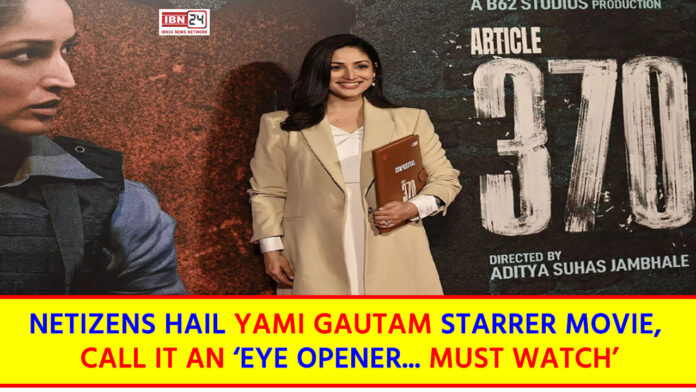Article 370 reviews
Article 370 reviews : As audiences look forward to election season, filmmakers are beginning to get involved in the campaign. The first is Article 370, a compelling official statement of the Kashmir government’s policy that led to the abrogation of the controversial constitutional provision on August 5, 2019.
These are current events that are deeply etched in the public memory, but the makers seem to be aiming to make the audience believe what led to the scrapping of Jammu and Kashmir’s special status before the ruling party goes to the polls. The film quickly presents it as a tour de force that leads to a conclusion whose long-term ramifications are yet to be revealed.

Article 370 reviews : Like an eye-catching PowerPoint presentation with upbeat background music, director Aditya Suhas Jambhale brilliantly connects the dots that are often forgotten in the hustle and bustle of discussions on electronic news channels. The timing of this publication does not seem to be a coincidence. Aditya Dhar’s Uri (2019) was a powerful demonstration of what was behind the surgical strikes against Pakistan after the 2016 Uri attack. This film was also released in an election year. Dhar is one of the producers and writers of Article 370 and his better half, talented actor Yami Gautam, is leading the team here as Agent Zuni Haksar. Zuni, a Kashmiri pundit with a personal grudge against the country’s corrupt political leaders, is in a strategic position to spread the American narrative against them.

Writers craft historical events based on the political narratives of the ruling class. So while the alliance between Prime Minister Jawaharlal Nehru and Sheikh Abdullah was incomplete, but the film keeps mum on the takeaways of the Bharatiya Janata Party’s coalition government with Jammu and Kashmir People’s Democratic Party.
Article 370 reviews : While uri has every right to be jingoistic, the material here makes it a little more nuance , and Jambala resists tonal exaggeration. The film deftly portrays how behind-the-scenes diplomacy collapsed and the reliable methods of negotiating with separatists and double agents to bring temporary peace to the valley became obsolete. More importantly, it addresses the issue of terrorism and the economics of conflict to reveal the moral ambiguity of the separatist movement and local political leadership. This matrix makes no attempt to define Delhi’s role, but the pragmatic approach to the problem works and gives strength to the story.

But in its attempt to demonize Kashmiri leaders, the film reveals a lot about their former friends in Delhi. Anyone who watches the film gets the impression that the current politics on the Kashmir issue favors formality over constitutional morality. And that violating human rights is an option for the civil servant. In a key scene after the confrontation with Burhan Wani, when his superior Zooni asks Wani whether he could have done it differently, he replies that he did not hand over the suspected terrorist’s body to his family. That he was capable of it. . It gives us the idea that land is more important than people. All the talk of providing reservation to the scheduled castes and tribes sounds hollow for a film that sees Kashmir as an integral part of India invests very little in depicting Kashmiris as people with flesh and blood. They are presented as opportunistic parasites for whom 370 was an article of faith, literally.
Seasoned performer Raj Zutshi plays a political figure that seems like a cross between Farooq and Omar Abdullah with a diabolic flourish. Similarly, the ever-reliable Divya Seth turns Mehbooba Mufti into a quiet manipulative monster. In contrast, Arun Govil, making an impactful comeback, adds graces and gravitas to the character of the PM. Kiran Karmarkar, as the Home Minister, is an answer to the claptrap theatrics of Zutshi.

Those who support the official narrative often complain that the ecosystem has not changed despite the change in government. The manufacturers tried to convey their point of view through a so-called “systematic” approach. The idea of two women controlling their emotions is interesting. And Yami and Priyamani always deliver as determined deputies in the Prime Minister’s Office. Yami in particular embodies a fiery character who strives to save his goal from a process that does not produce the desired results. But at a certain point, when the film is reduced to a two-woman show, the process becomes increasingly simple and resembles the one-man army that once existed in the Bollywood landscape. It seems that the makers want to avoid the spirit of democracy in the adaptation too.
Also read BRS MLA Lasya Nanditha, 37, killed in road mishap in Hyderabad
किसान आंदोलन Big Update : खनौरी में मारे गए किसान शुभकरण के परिवार को ₹1 करोड़ की मदद
